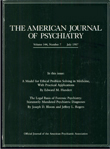Characterizing quality of life among patients with chronic mental illness: a critical examination of the self-report methodology
Abstract
OBJECTIVE: The purposes of the study were 1) to characterize the quality of life of three patient groups with chronic mental illness, 2) to evaluate differences in reported life quality among the three groups, and 3) to evaluate the validity of a self-report methodology by comparing these results with several objective indicators of life quality. METHOD: The study group consisted of chronically mentally ill patients with schizophrenia (N = 69), bipolar disorder (N = 37), or major depression (N = 35). Subjects were administered the Quality of Life Index, and comparisons of both objective and self-report life quality indices were made among the three groups. Quality of life ratings of these subjects were also compared with those of patients with a chronic physical illness. RESULTS: The two groups with mood disorders reported significantly lower scores on the Quality of Life Index than the patients with schizophrenia. Moreover, the scores on the Quality of Life Index for patients with schizophrenia were very similar to those of the comparison group of physically ill patients. The opposite trend emerged when groups were compared with respect to objective indicators of life quality. Schizophrenic patients experienced more objectively aversive life circumstances than either of the affectively disturbed groups. CONCLUSIONS: The validity of self- report measures of life satisfaction is questioned, particularly for use with affectively disturbed populations, since scores may be influenced by affective bias, poor insight, and recent life events.



